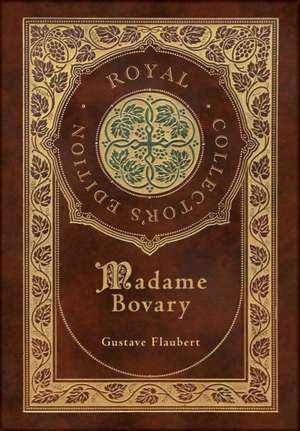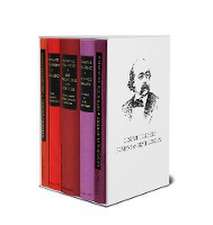Madame Bovary (Royal Collector's Edition) (Case Laminate Hardcover with Jacket)
Autor Gustave Flauberten Limba Engleză Hardback – 15 noi 2022
Preț: 261.24 lei
Nou
Puncte Express: 392
Preț estimativ în valută:
49.99€ • 52.33$ • 41.36£
49.99€ • 52.33$ • 41.36£
Carte tipărită la comandă
Livrare economică 07-21 aprilie
Preluare comenzi: 021 569.72.76
Specificații
ISBN-13: 9781774766392
ISBN-10: 1774766396
Pagini: 292
Dimensiuni: 152 x 229 x 21 mm
Greutate: 0.6 kg
Editura: Engage Books
ISBN-10: 1774766396
Pagini: 292
Dimensiuni: 152 x 229 x 21 mm
Greutate: 0.6 kg
Editura: Engage Books
Notă biografică
Gustave Flaubert (12 December 1821 - 8 May 1880) was a French novelist. Highly influential, he has been considered the leading exponent of literary realism in his country. He is known especially for his debut novel Madame Bovary (1857), his Correspondence, and his scrupulous devotion to his style and aesthetics. The celebrated short story writer Guy de Maupassant was a protégé of Flaubert. In 1850, after returning from Egypt, Flaubert began work on Madame Bovary. The novel, which took five years to write, was serialized in the Revue de Paris in 1856. The government brought an action against the publisher and author on the charge of immorality, which was heard during the following year, but both were acquitted. When Madame Bovary appeared in book form, it met with a warm reception. In 1858, Flaubert travelled to Carthage to gather material for his next novel, Salammbô. The novel was completed in 1862 after four years of work. Drawing on his youth, Flaubert next wrote L'Éducation Sentimentale (Sentimental Education), an effort that took seven years. This was his last complete novel, published in the year 1869. Flaubert famously avoided the inexact, the abstract and the vaguely inapt expression, and scrupulously eschewed the cliché. In a letter to George Sand he said that he spends his time "trying to write harmonious sentences, avoiding assonances." Flaubert believed in, and pursued, the principle of finding "le mot juste" ("the right word"), which he considered as the key means to achieve quality in literary art. He worked in sullen solitude-sometimes occupying a week in the completion of one page-never satisfied with what he had composed. In Flaubert's correspondence he intimates this, explaining correct prose did not flow out of him and that his style was achieved through work and revision.


















